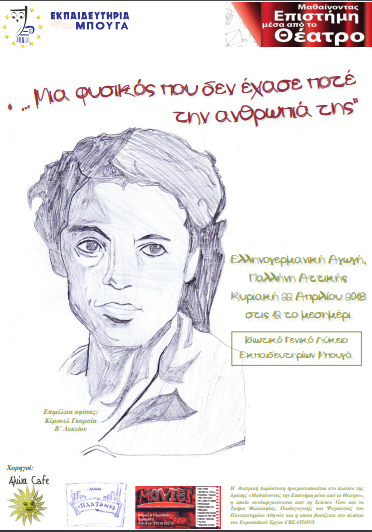
The educational activity “Learning Science Through Theater” is an initiative of Science View that is carried out annually in cooperation with variable agents (Faculty of Philosophy, Pedagogy and Psychology of National and Κapodistrian University of Athens, Elliniogermaniki Agogi, Noesis Science Center and Technology Museum and more). The target group is students aged 12-16 (first grade of middle school – second grade of high school), while this year students from primary education (ages 9-12) will participate as well. Students are expected to dramatize scientific concepts and knowledge from their school curriculum. The activity was created in the context of the European project CREAT-IT (www.creatit-project.eu) and based on the features of inquiry learning on science related courses (Inquiry Based Science Education), as well as on the pedagogical framework of the European project CREATIONS (http://creations-project.eu/) and one of the cases of implementation in Primary Education Schools of the European project Creativity, Art and Science in Primary Education (CASE) (http://www.project-case.eu/). It is also one of the accelerators of the European project Open Schools for Open Societies (OSOS) (http://www.openschools.eu/) as well as a proposed activity of the Greek educational communities of Open Discovery Space (ODS) and Inspiring Science Education (ISE).
In the context of the activity, students will implement a theatrical performance related to scientific concepts and will learn science in a creative way. The specific objectives of the activity, which have as a central axis the interdisciplinary interconnection of science with aspects of art, aiming at the enhancement of students’ interest in science, involve both students and teachers. More specifically, through this activity, students will comprehend scientific concepts and phenomena, develop a spirit of cooperation and teamwork, will actively participate in the negotiation of scientific concepts and they will develop creative and critical thinking skills. Also by participating in dissemination activities and entrepreneurial actions for the promotion and support of their theatrical performance, they will contribute in further bridging school with society and at personal level developing their social and entrepreneurial skills. This year our school is participating in the educational activity “Learning Science Through Theater” presenting “Lise Meitner: a physicist who never lost her humanity”, a school play by students of our high school.
Lise Meitner ( 7 November 1878 – 27 October 1968) was an Austrian-Swedish physicist who worked on radioactivity and nuclear physics. Meitner and Otto Hahn led the small group of scientists who first discovered nuclear fission of uranium when it absorbed an extra neutron. Meitner and her nephew Otto Frisch understood that the fission process, which splits the atomic nucleus of uranium into two smaller nuclei, must be accompanied by an enormous release of energy.
She was the first woman to become a full professor of physics in Germany. She lost these positions in the 1930s because of the anti-Jewish Nuremberg Laws of Nazi Germany, and in 1938 she fled to Sweden.
Meitner received many awards and honors late in her life, but she did not share in the 1944 Nobel Prize in Chemistry for nuclear fission that was awarded exclusively to her long-time collaborator Otto Hahn.
In 1997, element 109 was named Meitnerium (Mt) in her honor. Her nephew Frisch composed the inscription on her headstone. It reads: Lise Meitner: a physicist who never lost her humanity.


